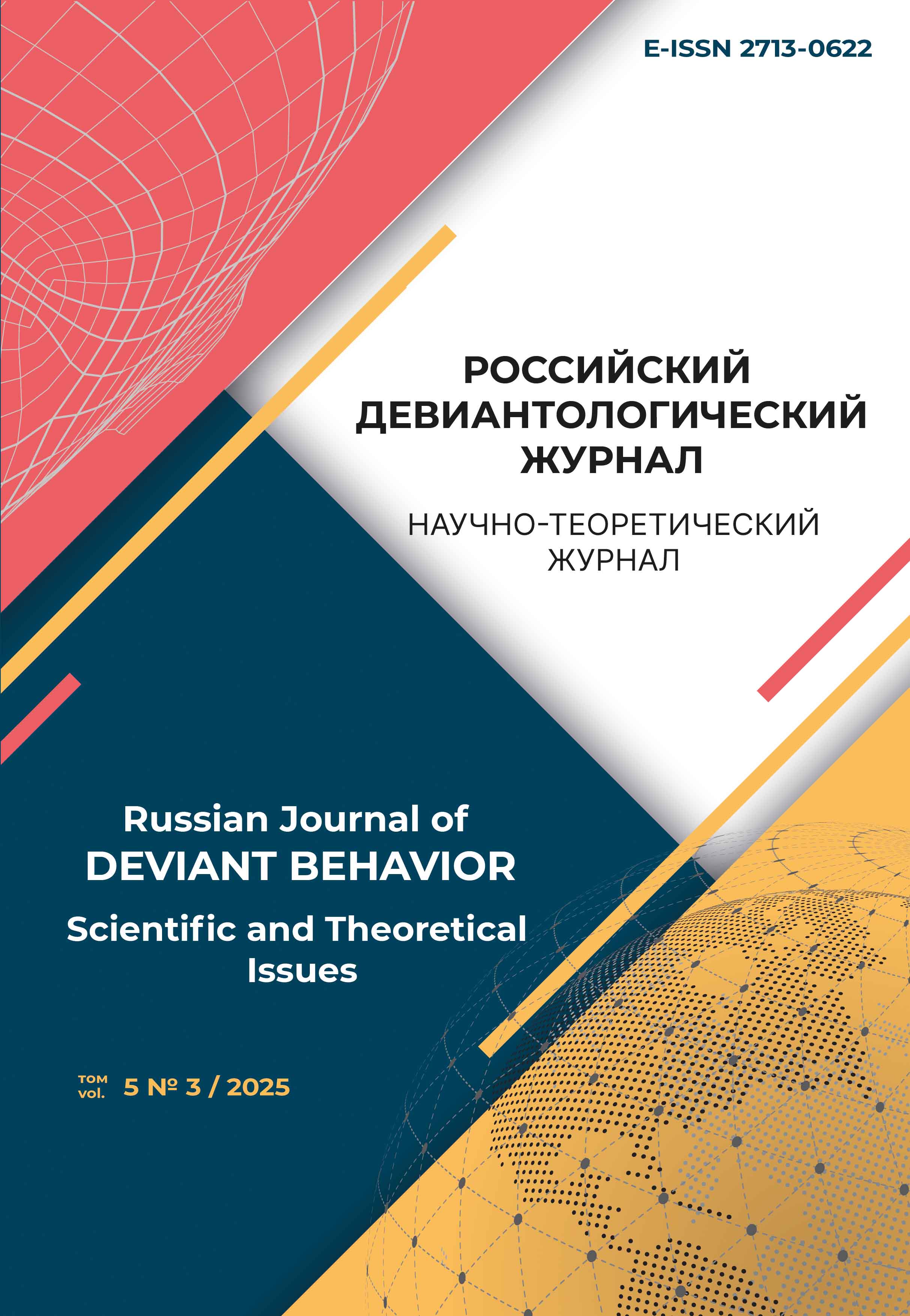employee from 01.01.2016 until now
Ural Law Institute of the Ministry of Internal Affairs of the Russian Federation (kafedra filosofii, psihologii i gumanitarnyh disciplin, docent)
from 01.01.2016 until now
Ekaterinburg, Ekaterinburg, Russian Federation
employee
UDC 379.823
Introduction. The widespread fascination of today’s youth with media products often has destructive effects. The purpose of this article is to study the factors and degree of effectiveness of the deviantogenic influence of media products on students. To achieve this goal, negative psychological attitudes promoted by deviant media products were identified, and an empirical study was conducted to establish a link between young people’s fascination with certain media products and the formation of negative personality traits influencing both personality development and professionalisation. Methods. The authors applied a dialectical approach to the problem under consideration, combined with the use of general scientific (formalisation, analysis, modelling) and theoretical methods of social sciences and humanities (structural-functional, systemic methods). The empirical study was based on a combination of sociological and psychological techniques. Results. It has been proven that modern media products do indeed have a significant impact on the socialisation and professionalisation of young people. The deviantogenic influence of media products is confirmed by the formation of negative personality traits in young people. The level of this influence manifests itself in the formation of a stable media dependence – media addiction – in young people. The study identified specific manifestations of media addiction: denial of the influence of media products on the psyche of their consumers, denial of problems in relationships with people that may be the result of media dependence. The authors of the research established the undeniable negative impact of deviant content on the professional development of students: the more negative personality traits respondents demonstrated during psychological testing, the more pronounced their scepticism about their future professional activities, loss of interest in them, and lack of understanding of their social significance.
media production, media space, media psychology, mass media, media socialisation, destructive behavior, negative informational and psychological impact, media dependence, media addiction
1. Bakulev, G. P. (2015). Problema internet-zavisimosti v svete klassicheskih teorij massovoj kommuni-kacii. Vestnik RGGU. Seriya: Politologiya. Istoriya. Mezhdunarodnye otnosheniya. Zarubezhnoe regionovedenie. Vostokovedenie, 1 (1), 21–29.
2. Grebenkina, Yu. V. (2019). K voprosu o pedagogicheskoj profilaktike destruktivnogo vliyaniya me¬diasredy na social'noe razvitie detej i molodezhi. Pedagogika: vchera, segodnya, zavtra, 2 (1), 36–42.
3. Dresvyannikov, V. L., Chuhrova, M. G., Pronin, S. V. (2015). Internet-zavisimost': monografiya. Novo¬sibirsk: OOO «Nemo Press».
4. Zhizhina, M. V. (2020) Mediapsihologiya: novyj kontekst zadach i napravlenij issledovaniya. Sovre¬mennaya nauka: aktual'nye problemy teorii i praktiki. Seriya: Poznanie, 12, 49–52. https://doi. org/10.37882/2500-3682.2020.12.13
5. Knizhnikova, S. V. (2014). Medianasilie: «bit' ili ne bit'»? Narodnoe obrazovanie, 5 (1438), 193–199.
6. Kovalev, A. A. (2010). Mediareal'nost' kak fenomen sovremennoj kul'tury. Vestnik Moskovskogo gosu¬darstvennogo universiteta kul'tury i iskusstv, 6 (38), 70–74.
7. Kolomiec, V. P. (2023). Mediasociologiya: predmetnoe i obrazovatel'noe prostranstvo. Kommunikacii. Media. Dizajn, 8 (2), 33–51.
8. Krivoruchko, M. V. (2019). Televizionnye predpochteniya kak prediktory deviantnogo povedeniya v podrostkovom vozraste. Vestnik Omskogo universiteta. Seriya «Psihologiya», 1, 57–67. https:// doi.org/10.25513/2410-6364.2019.1.57-67
9. Nekrasov, A. S., Nekrasov, S. I., Nekrasova, N. A., Klepackij, V. V. (2019). Ot «cheloveka informa-cionnogo» k «cheloveku cifrovomu». Vestnik Universiteta Rossijskoj akademii obrazovaniya, 3, 4–10.
10. Savchuk, V. V. (2012). Mediafilosofiya. Pristup real'nosti. Saint Petersburg: Izdatel'stvo RHGA.
11. Smirnov, A. A. (2012). Sredstva massovoj informacii v mekhanizme determinacii protivopravnogo povedeniya. Nauchnyj portal MVD Rossii, 2, 26–34.
12. Fedorov, A. V. (2001). Mediaobrazovanie: istoriya, teoriya i metodika: monografiya. Rostov-na-Donu: Izdatel'stvo CVVR.
13. Hisamutdinov, F. R., Shalagin, A. E. (2015). Kriminal'naya subkul'tura i ee preduprezhdenie. Vestnik Kazanskogo yuridicheskogo instituta MVD Rossii, 2 (20), 46–52.
14. Chernikova, V. E. (2014). Konflikt tradicionnyh moral'nyh cennostej i cennostej informacionnogo obshchestva. Vestnik Adygejskogo gosudarstvennogo universiteta, Seriya 1: regionovedenie: filosofiya, istoriya, sociologiya, yurisprudenciya, politologiya, kul'turologiya, 3 (144), 45–50.
15. Shanin, S. V. (2015). Profilaktika i diagnostika mediazavisimosti obuchayushchihsya. Vestnik Belgorodskogo instituta razvitiya obrazovaniya, 2, 96–99.
16. Bazalgette, C., Bevort, E., & Savino, J. (1992). L’Education aux medias dans le monde: Nouvelles orien¬tations. Paris: BFI, CLEMI, UNESCO.
17. Couldry, N., & Hepp, A. (2017). The Mediated Construction of Reality. Cambridge: Polity.
18. Hart, A. (1997). Textual Pleasures and Moral Dilemmas: Teaching Media Literacy in England. In R. Kubey (Ed.), Media Literacy in the Information Age. New Brunswick and London: Trans¬action Publishers.
19. Hartmann, F. (2000). Medienphilosophie. Wien: WUV-Universitätsverlag.
20. Lee, C. S., & Ma, L. (2012). News Sharing in Social Media: The Effect of Gratifications and Prior Experience. Computers in Human Behavior. 28 (2), 331–339. https://doi.org/10.1016/j. chb.2011.10.002
21. Margreiter, R. (2003). Medien/Philosophie: Ein Kippbild. In Medienphilosophie: Beiträge zur Klärung eines Begriffs. Frankfurt am Main: Fischer-Taschenbuch-Verl.
22. McQuail, D. (2010). Mass Communication Theory (6th ed.). London, Sage.
23. Pronina, E. E. (2014). Media psychology: Modern man and nonlocality of psyche. Psychology in Rus¬sia: State of the Art, 7 (4), 75–87. https://doi.org/10.11621/pir.2014.0407
24. Winterhoff-Spurk, P. (2004). Medienpsychologie: eine Einführung. Stuttgart: Kohlhammer.














